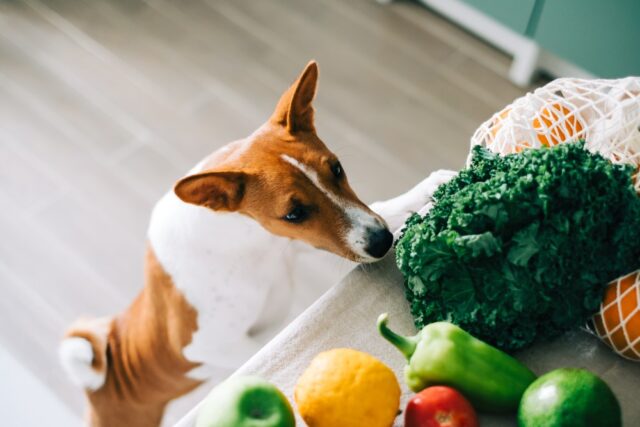
If you are a dog owner, chances are that you always want to share some of your food with your pooch. While table scraps aren’t a good idea –you can always feed vegetables to your dog as a snack or an occasional treat.
Vegetables are loaded with vitamins, minerals, fibers and antioxidants, and have amazing health benefits for dogs. So, adding some veggies in your dog’s diet will improve their health and well-being.
It is true that not all vegetables that people eat are safe for dogs, in fact, some may be toxic and dangerous to your dog. So, here is a list of all vegetables you can feed your furry best friend;
Carrots
Carrots are a great low calories snack that are high in in fiber and beta-carotene which in turn produces vitamin A that aids in strengthening the immune system and skin conditioning.
Additionally, these crunchy vegetables are great for eyesight, clean your dog’s teeth and freshen their breath.
You can serve them raw (whole) or slightly steamed and cut into small pieces.
Green beans
Green beans are safe for your furry friend. Whether raw, steamed, canned or chopped, your dog will enjoy green beans in any form. Just remember not to add any oils or spices, keep them plain.
Green beans are high in fiber, vitamins and low calories that are important for your dog’s well-being.
Peas
Peas are another vegetable that dogs can eat. They are a healthy low calorie treat option for your pup. Dogs can eat peas such as snow peas, sugar snap peas, English peas and garden peas.
Peas are an excellent source of fiber, vitamins A, K and B, and minerals such as zinc, iron, potassium and magnesium.
While peas are nutritious, avoid canned ones as they come with sodium, you don’t want your best friend digesting too much salt. Always opt for low salt or no salt when it comes to canned products for your dog.
Celery
Celery is very affordable, safe and healthy vegetable making it an excellent treat for your pooch.
A lot of health benefits come with these low-calorie vegetables. Celery contain vitamins A, B and C, and minerals such as potassium, manganese and phosphorous among other benefits.
All these nutrients help in fighting cancer, the low calorie and fat is great for weight loss and promotes a healthy heart. The crunch also helps freshen the dog’s breath.
With all said, these vegetables should be used sparingly to avoid irritating your dog’s tummy.
Broccoli
Broccoli florets will make a great snack for your dog and especially for puppies. Broccoli is high in Fiber, Vitamin C, vitamin K, potassium, and low in fat, overall boosting the immunity of your dog.
It is safe for them to eat raw or cooked, as long as no seasonings are added. Giving big pieces is hazardous to them and small pieces would prevent choking. Also, you can measure how much they have consumed.
Broccoli is safe for dogs to eat but in very small quantities. This means that it should be served as occasional treat.
Cucumber
Do you have a pooch who could afford to lose a few pounds or who is looking to stay in shape? Then cucumber is the perfect snack since they are low in carbs and high in nutrients.
Cucumbers are loaded with vitamins C, K and B1 and minerals such as potassium, copper magnesium, and biotin.
Beware not to feed too many since they could cause stomach issues.
Pumpkin
Pumpkin is packed with nutrients. It contains vitamins, minerals, fiber that aids in digestive health and it’s also very tasty.
Fed in small quantities, the high fiber alleviates diarrhea and constipation. The easiest way for you to give some to your best friend is to scoop out some canned pumpkin, or lightly cook them, just ensure it’s plain and not mixed with spices.
Sweet potato
Sweet potatoes make nutritious food for dogs when prepared and served correctly. They offer vitamins such as A, B6 and C along with minerals and micronutrients.
These tasty root vegetables should be given to your dogs in small pieces after they have been cooked.
Ensure to avoid cooking sweet potatoes with any milk, butter or seasonings. All these add-ins can cause stomach problems for your pup. Also, keep an eye on the calories if your dog is in the heavy side.
Cauliflower
Cauliflower is another vegetable that is rich in nutrients that are essential for your pup’s wellbeing. Cauliflower contains vitamin B, C, and K along with omega3 fatty acids—biotin, choline, manganese and phosphorous. All these nutrients strengthen the immune system by adding healthy red blood cells.
Raw cauliflower is hard to digest for dogs, so, it is best served lightly cooked. Try adding cauliflower florets in your dog’s food for nutritious supplement in their diet.
Brussels sprouts
These little green vegetables are full of vitamins C and A, manganese and fiber. Just like cauliflower, brussels sprouts is best served steamed since raw is hard to digest.
Ensure to give in moderate potions since too many will upset your dog’s tummy with gas.
Zucchini
Zucchini is a great snack treat for your furry friend. They are an excellent source of magnesium and potassium. Cutting small pieces on top of your dog’s regular food is a good way to incorporate it in their diet.
Zucchini will help keep your best friend away from infections, cancer and cardiovascular diseases.
Spinach
Dogs can eat spinach but in very small quantities. Spinach is all round vegetable for dogs. They’re high in iron and also a good source of vitamins.
Beware to give in small quantities since the oxalic acid in spinach can cause kidney issues if a dog consumes in large amounts.
Give Your Dog Veggies
A balanced diet for your best friend includes meat, fruit and vegetables. If you’re yet to introduce vegetables to your pup, then you should.
Vegetables can be a great addition to your dog’s diet. The benefits are immense if you stick to vegetables that dogs can eat and if you give them the appropriate amount. Too much will upset their digestive system.
Ensure you wash your vegetables before serving them to your dog and give in small pieces according to the size of your dog to prevent chocking.


































